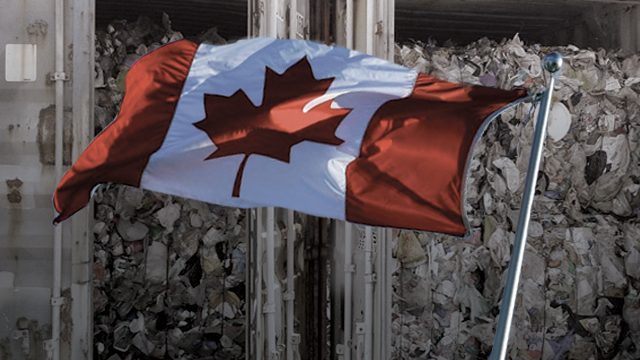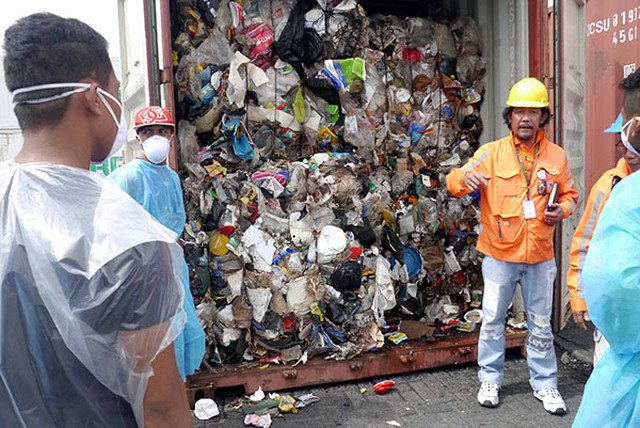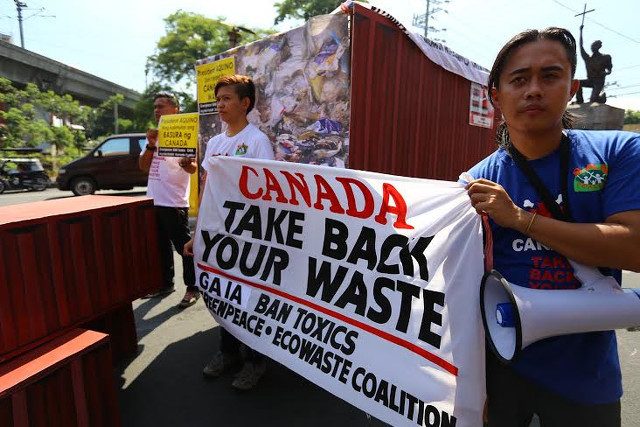SUMMARY
This is AI generated summarization, which may have errors. For context, always refer to the full article.

MANILA, Philippines (UPDATED) – While people swooned over Canadian Prime Minister Justin Trudeau during his visit, many still called him out for his government’s inaction on his country’s garbage illegally shipped to the Philippines starting 2013.
Trudeau was in the country earlier this week for the 31st Summit of the Association of Southeast Asian Nations (ASEAN). (READ: 4 hard truths about Justin Trudeau)
The issue of one Canadian company’s illegal shipment of trash hounded the Prime Minister’s visit with he himself calling it a “longstanding irritant” with Manila.
It has been more than 4 years since the first batch of Canadian shipping containers full to the brim with garbage arrived in the Philippines, yet the problem remains unsolved. What has happened since?
June to August 2013
A total of 50 container vans arrive in 6 batches at the Manila International Container Port (MICP) from June to August 2013.
The vans, declared to contain recyclable plastic scrap materials, are shipped by Chronic Plastics Incorporated (CPI), an export company based in Ontario, Canada. The declared total value for 19 of the containers is P3.9 million.
December 2013 to January 2014
At least 48 container vans containing household trash arrive in 4 batches in Manila from Canada.
The Department of Environment and Natural Resources (DENR) says the Bureau of Customs should send it back after it was not claimed by consignee Live Green Enterprise.
January 21, 2014
The Bureau of Customs discovers the garbage on January 21, 2014 when they open container vans as part of procedures on shipments not claimed for a long period of time.
The 18 vans opened by the Bureau contains plastic bottles, plastic bags, newspapers, household garbage, and used adult diapers. The discovered waste are classified as hazardous as per Toxic Substances and Hazardous and Nuclear Waste and Control Act of 1990, or Republic Act 6969.
BOC decided not to open the rest of the containers fearing that they too contain hazardous waste that could further contaminate surroundings. According to the Department of Health, disinfecting the 18 opened vans costs the government P20,000 ($393).

February 20, 2014
BOC files a smuggling complaint against the company which allegedly imported the garbage shipment from Canada to the Philippines on February 20, 2014.
Charges are filed against Adelfa Eduardo, owner of Chronic Plastics, and its licensed Customs brokers Leonora Flores and Sherjun Saldon, for violating the Toxic Substance and Hazardous Wastes and Nuclear Wastes Control Act of 1990.
They are also accused of violating the Tariff and Customs Code of the Philippines (TCCP).
March 2014
The Department of Foreign Affairs (DFA) starts sending letters to the Canadian embassy in the Philippines requesting for assistance in shipping the garbage back to Canada.
April 24, 2014
Then Canadian ambassador Neil Reeder tells the Department of Foreign Affairs (DFA) during a meeting that his government “would like to explore with the Philippines options for processing the rest of the shipment – in accordance with Philippine law – in the Philippines.”
June 9, 2014
Reeder allegedly tells the DFA that the Canadian government “has no domestic or international authority to compel the shipper to return the shipment to Canada.”
While Canadian law imposes penalties on violations of import and export laws, it does not provide a mechanism to compel the return of illegal shipments to the port of origin.
May 2015
Despite calls made by various local environmental groups, then president Benigno Aquino III says he did not discuss the issue of the illegally shipped Canadian garbage in Manila when he met with then Canadian Prime Minister Stephen Harper during a state visit in May 2015.
According to Aquino, the issue has been addressed locally and there has been recent developments in the case. Meanwhile, the Manila City Council adopts a resolution seeking to remove the 50 shipping containers of garbage from Canada.

June to July 2015
The contents of at least 26 containers vans are dumped at a landfill in Capas, Tarlac, between June and July 2015 despite protests from environmental groups.
July 2015
The Bureau of Customs (BOC) and the Department of Environment and Natural Resources (DENR) ask the Department of Foreign Affairs to file a diplomatic protest against Canada to “prevent a repeat of the unfortunate incident and enjoin the government of Canada to revisit their domestic regulations on the export or illegal traffic of wastes.”
The letter, signed by then Customs deputy commissioner for enforcement Ariel Nepomuceno and then DENR undersecretary Jonas Leones, also ask the DFA to formally request from the Canadian government “documents and other evidence to support our legal action” against Chronic Plastics.
It, however, does not reflect the sentiments of various environmental groups which called on Canada to take back their garbage.
Three days after the letter is sent, DFA says it will relay a diplomatic note to the Canadian embassy “which will underscore the Philippine government’s position on the issue and to reiterate our request for the Canadian government to take appropriate action.”
It is the 3rd note sent by the DFA to Canada. The first two notes relay “the Philippine government’s request for the Canadian government to assist with the re-exportation of the containers” and conveys its “objection to the presence of the containers”.
November 2015
Canadian Prime Minister Justin Trudeau, during his first visit to the Philippines to attend the Asia-Pacific Economic Cooperation (APEC) summit in November 2015, is non-committal on calls for Canada to bring back 103 container vans of trash. He says the issue “exposed a problem that needs fixing within our own legislation.”
“Well, I think, going forward, we need to ensure that if a situation like this were to arise once again that the Canadian government has more power to actually demand action from the companies responsible,” Trudeau says. “I believe there are loopholes here that were allowed to be skirted that we need to make sure we close, both for Canada’s interest and for our good relationships with our neighbors,” he adds.
June 30, 2016
Manila Regional Trial Court Branch 1 Judge Tita Bughao Alisuag orders on June 30, 2016 the shipping back of the wastes to Canada at the expense of the importer.
November 2017
Unlike his statement when he first went to the Philippines in 2015, Trudeau says it is now “theoretically” possible for Canada to bring back 103 container vans of trash illegally shipped to the country. He, however, does not make a full commitment to move the garbage out of the country yet.
“Even though it originally came from Canada, we had legal barriers and restrictions that prevented us from being able to take it back,” he says. “Those regulations and those impediments have now been addressed, so it is now theoretically possible to get it back.”
Emphasizing that the trash came from a private business, Trudeau says that both the Canadian and Philippine governments need to iron out certain details, including who will shoulder the costs of shipping back the trash to the country of origin.
June 2018
The Office of the Ombudsman orders the suspension of DENR Undersecretary Juan Miguel Cuna in connection with the shipment. The Ombudsman finds Cuna guilty of simple misconduct and orders his suspension, without pay, for 3 months.
The Ombudsman discovers that Cuna “acted with gross inexcusable negligence when he issued a Registry Certificate in favor of Chronic Plastics despite the insufficient details in its Importer Registry Sheet.”
November 2018
Technical working groups composed of representatives from the Department of Justice, DENR, DFA, and BOC are formed to resolve the issue. The technical working groups are set to meet in the first quarter of 2019.
January 2019
Environment group EcoWaste Coalition sends letters to Trudeau and the Canadian Environment Minister, saying that the presence of Canada’s trash in the country’s port is immoral and illegal. The group said that the shipment of garbage violates the Basel Convention on the Control of Transboundary Movement of Hazardous Wastes and their Disposal.
The convention, ratified by both Canada and the Philippines, states that the management of such waste “may not under any circumstances be transferred to the States of import or transit.”
International groups back EcoWaste and send a letter to Trudeau the following month, also urging him to ratify the Basel Ban Amendment, which prohibits the export of hazardous waste from developed to developing countries.
April 2019
President Rodrigo Duterte tells Canada to take back its garbage and theatens to “declare war” with that country if it fails to do so.
“‘Yung basura ng (The garbage of) Canada, I want a boat prepared. I give a warning to Canada, maybe next week, they better pull their thing up or I will set sail sa (to) Canada, ibuhos ko basura nila doon (I will dump their garbage there),” he says during a meeting with Pampanga officials on the strong earthquake that struck parts of Luzon.
“I’ll declare war against them, isauli ko talaga tingnan mo (I will really return that, you’ll see), karga mo ‘yan sa barko, load it to a ship and advise Canada, I will advise Canada that your garbage, prepare a grand reception. Eat it if you want to,” Duterte adds. – With reports from Janelle Paris/Rappler.com
Add a comment
How does this make you feel?
There are no comments yet. Add your comment to start the conversation.